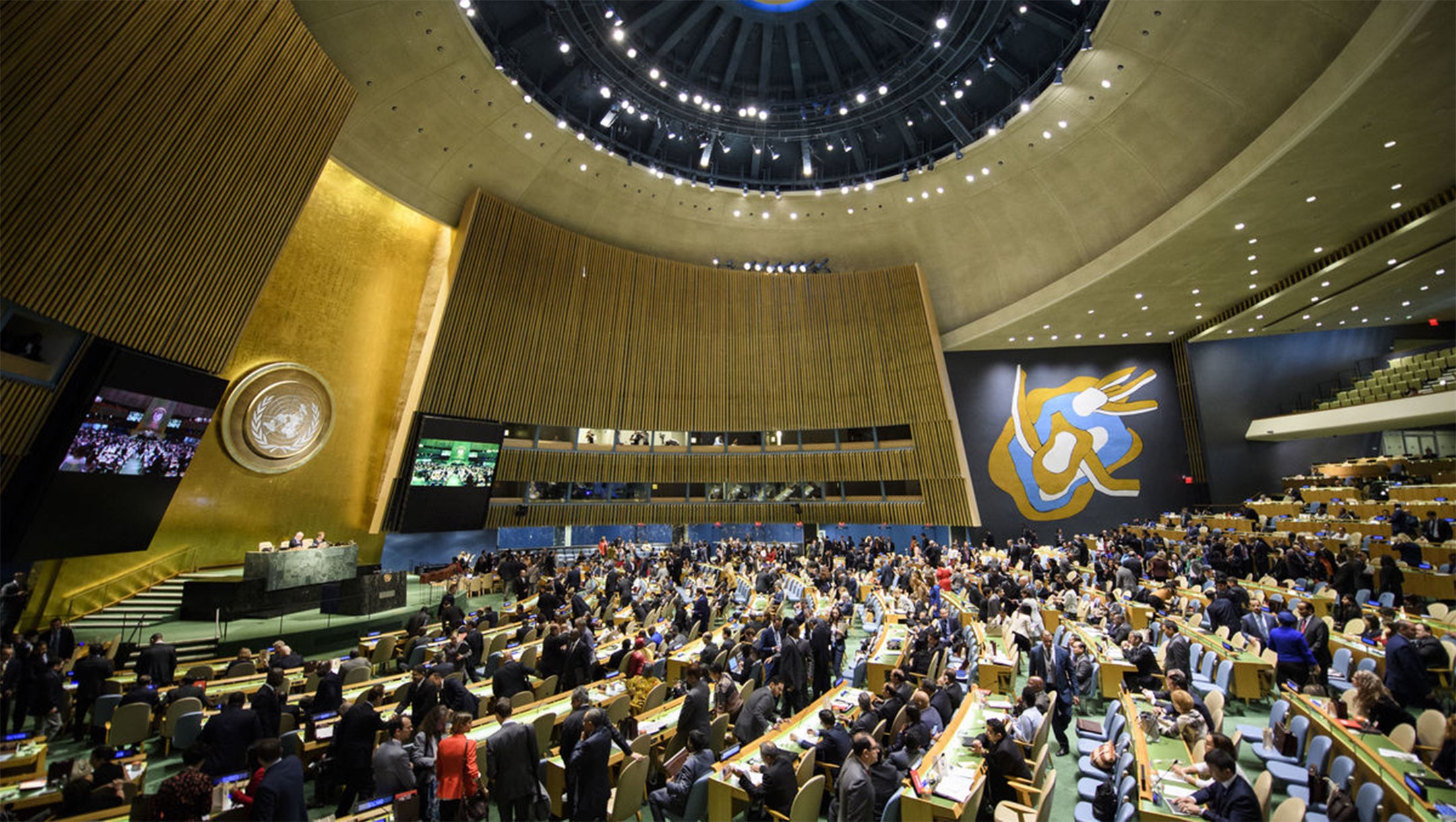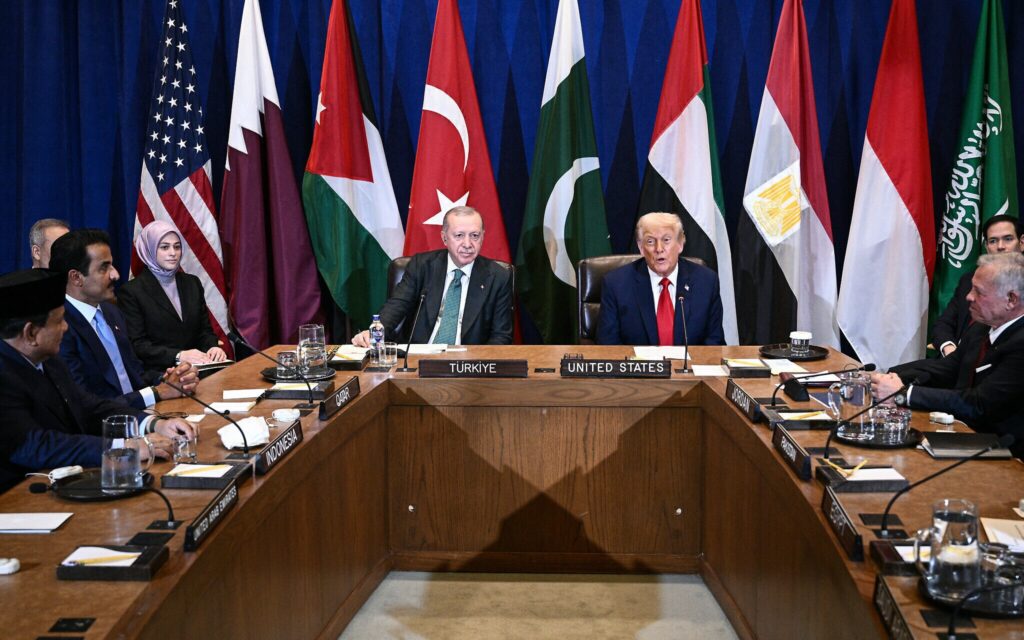
The National Interest Foundation Newsletter
Issue 303, September 26, 2025
Welcome to our NIF Newsletter. In this week’s edition, we provide analysis regarding how more Western countries have recognized a Palestinian state to coincide with the United Nations General Assembly’s annual meeting, while also delving into U.S. President Trump’s meeting with Arab and Muslim heads of state.
Editor: Bassam Tarbush
More Western Countries Recognize Palestinian State to Coincide with United Nations General Assembly’s Annual Meeting

As the United Nations General Assembly’s (UNGA) annual meeting takes place this week in New York City, much of the focus has been dedicated to the ever-growing number of countries announcing formal recognitions of Palestinian statehood. This notable diplomatic development is occurring against the backdrop of increasing global criticism towards Israel’s unlawful actions in both Gaza and the occupied West Bank. The significant wave of additional Palestinian statehood recognitions highlights the unprecedented level of denunciation regarding Israel’s continued violations, as well as its deepening international isolation. On Sunday, in the lead-up to the start of the UNGA’s high-level general debate, several Western countries including the United Kingdom, Canada, and Australia issued official recognitions of Palestinian statehood which were followed by ones from France and a handful of others on Monday. The latest array of these has meant that over 80% of UN member states – an overwhelming majority of the international community – now formally recognize Palestine.
The motivations for the new wave of Palestinian statehood recognitions have been largely driven by growing outrage and objection to Israel’s devastating military assault on Gaza and the appalling humanitarian catastrophe that it has created. This has prompted widespread condemnation from countries around the world, with many framing their diplomatic moves as a response to what has been unfolding during the past nearly two years there. Rebuke over the Gaza War has spurred large public protests and shifted public opinion against Israel, and thus a host of governments are responding to this domestic pressure by taking stronger positions too in order to signal their disapproval of Israel’s actions. Furthermore, the strengthening consensus regarding Israel’s genocidal conduct in Gaza has played a role in prompting additional nations to recognize Palestine as an important acknowledgement of the fundamental rights of the Palestinian people. On top of Israel’s egregious actions in Gaza, the alarming uptick of illegal settlement expansion and settler violence in the occupied West Bank have also fueled the widening global efforts to recognize Palestine as a way to reaffirm the unlawfulness of Israeli occupation and land theft. Palestinian statehood recognitions are intended to try to preserve the potential viability of a two-state solution as well, particularly in light of blatant Israeli government attempts to hinder it. The recent moves by France, the United Kingdom, and others also allow countries to increase political and legal pressure against Israel and further diplomatically isolate it and its primary remaining backer, the United States.
In his remarks during a summit co-hosted by France and Saudi Arabia at the UNGA a day before the start of the high-level general debate, UN Secretary-General António Guterres fittingly pointed out that recognition of Palestinian statehood is an undeniable right under international law, not in any way a reward – rejecting Israeli claims echoed by some Trump administration officials that it was a “reward for Hamas.” Proponents like Guterres have aptly contended that by offering a political and diplomatic path forward, moderates will be empowered while conversely, further denials of statehood and perpetuation of injustice will only serve to embolden extremists. As such, this month, the UNGA adopted The New York Declaration on the Peaceful Settlement of the Question of Palestine – a resolution supporting a two-state solution based on the 1967 lines, criticizing both Hamas and Israel, and calling for an end to the Gaza War. Various world leaders have also used the UNGA as a means of voicing their denunciation of Israel’s actions throughout the Middle East – underlining how its bellicose conduct threatens the prospects of regional and international peace and stability.
While it does not immediately change the circumstances or realities on the ground, analysts have stated that growing Palestinian statehood recognition goes beyond mere symbolism. It demonstrates a shifting global diplomatic landscape which strengthens Palestine’s legal and political standing, and places greater pressure on Israel to engage in a credible and legitimate peace process. The new wave of recognitions also solidifies the international community’s belief in Palestine’s right to statehood and increasingly isolates Israel, the United States, and the remaining holdouts on the issue. Moving forward, it remains to be seen whether or not this paves the way for the needed impactful political and economic measures to propel concrete positive progress.
Trump Meets with Arab and Muslim Heads of State

U.S. President Donald Trump took part in a multilateral meeting with Arab and Muslim leaders on the sidelines of the current 80th session of the United Nations General Assembly (UNGA). The gathering – attended by top officials from Egypt, Jordan, Qatar, Turkiye, Saudi Arabia, and others – was focused on ending the longstanding war in Gaza, with Trump presenting a plan aimed at doing so. The group of heads of state relayed support for the proposal, but while emphasizing several key conditions for their help in implementing the post-war plan such as a guarantee that Israel will not annex parts of the West Bank or Gaza and that humanitarian aid to the latter will immediately increase. Trump is reported to have pledged to the Arab and Muslim leaders that he would not allow Israel to annex parts of the occupied West Bank. For the leaders and those seeking to put an end to Israeli hostilities across the region, concern regarding the threat of potential Israeli annexation of the West Bank has grown in recent weeks. In light of the wave of new Palestinian statehood recognitions from a plethora of countries around the world, including several high-profile ones like France, the United Kingdom, Canada, and Australia, calls by Israeli officials for West Bank annexation in retaliation have intensified. This has prompted regional governments to issue warnings that Israel doing so would garner major negative repercussions, and thus they have sought to secure assurances from Trump against such a widely opposed move.
There appears to be a clear understanding regarding the universal objection to the prospect of Israeli annexation of the already illegally occupied West Bank. This is evidenced by the components of the Trump administration’s plan for ending the Gaza War, which was recently presented to the group of Arab and Muslim leaders at their gathering with the American president this week. Among the elements of the plan was a firm promise against Israeli annexation of the West Bank, in addition to other key aspects such as calls for a permanent ceasefire in Gaza, the release of remaining hostages, the withdrawal of Israeli forces from Gaza, the deployment of an international stabilization force, a proposal for post-war governance, global funding for reconstruction efforts, and an increase in the delivery of humanitarian aid. The group of heads of state also received guarantees from Trump that there would be no new Israeli settlements or occupation of Gaza, and against the forcible displacement of Gazans from the Palestinian territory. Strong opposition to the prospect of Israeli annexation has not only come from regional leaders, but from many European countries as well. Following Israel’s indication that it might annex parts of the occupied West Bank in response to new Palestinian statehood recognitions, several European countries and the European Union have condemned this and warned of possible consequences including economic sanctions if annexation proceeds.
Earlier this month, officials from the United Arab Emirates warned their Israeli counterparts that the annexation of the West Bank would be a “red line,” and that the move could be met with a downgrading of diplomatic ties. The United Arab Emirates was one of the countries which normalized relations with Israel as a part of the frequently criticized Abraham Accords back in 2020 – with the nature of the agreements often being dismissed by analysts and experts for failing to secure fair and needed concessions to advance the Palestinian struggle for social justice. Nevertheless, with some viewing the Abraham Accords as a diplomatic “achievement,” the United Arab Emirates’ warnings to Israel are noteworthy given that it was the most notable Arab nation to normalize relations with Israel and thus a deterioration of ties would be a significant development. If this was to transpire, it would also only add to Israel’s growing global diplomatic isolation – which has undeniably intensified due to its array of continuous violations in both Gaza and the West Bank.
Above all, on top of the sought guarantee that Israel will not be allowed to annex the West Bank, the group of Arab and Muslim leaders who recently met with Trump have urged the United States to use its leverage and influence over Israel to first and most importantly secure an end to the war in Gaza. They have outlined how this is needed in order to then address specific commitments and the implementation of post-war rebuilding and security efforts. For his part, Trump appears confident in the aftermath of this week’s gathering with Arab and Muslim leaders on the sidelines of the UNGA that the U.S. is close to getting, as he called it, “some kind of deal done” in Gaza. The American president later added that he would “have to meet with Israel” – in a reference to his planned meeting with Netanyahu at the White House next week.
